Finding a home that meets your needs should not be a struggle. But for people with disabilities in India, the search for accessible housing can feel like an uphill battle. Whether it’s apartment buildings without ramps, lifts that don’t work, or landlords unwilling to make modifications, the challenges are real.
The good news? You have rights. And more importantly, there are ways to enforce them. Accessible housing is not just a privilege—it’s a legal requirement. If you or someone you love is facing difficulties finding or securing a home that accommodates your needs, you’re not alone. Many people across India are working to make housing fair and accessible for all.
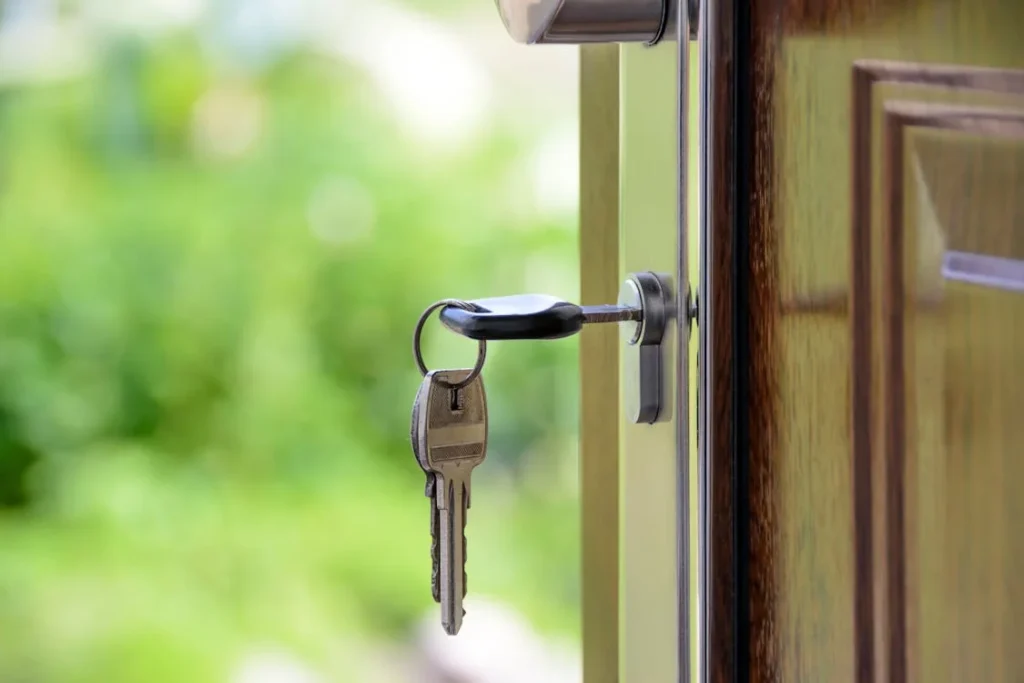
Understanding Your Right to Accessible Housing in India
Accessible housing is not a luxury—it is a necessity for millions of people in India. If you or a loved one has a disability, you deserve a home that allows you to live with dignity, independence, and safety.
The law recognizes this need, but many people are unaware of their rights or how to ensure they are upheld.
The Legal Foundation for Accessible Housing
India has taken significant steps to protect the rights of people with disabilities, especially when it comes to housing. The Rights of Persons with Disabilities (RPWD) Act, 2016 is the most important law in this area.
This law mandates that public and private housing must be accessible and that no one can be discriminated against because of their disability. It also requires government and private builders to follow accessibility standards in new construction projects.
In addition to the RPWD Act, the Real Estate (Regulation and Development) Act (RERA), 2016, ensures that builders follow approved plans, including accessibility features.
If a builder promises ramps, elevators with braille buttons, or wheelchair-friendly doorways, they are legally obligated to provide them. If they fail to do so, you have the right to take action.
Another crucial law is the Constitution of India, which guarantees equality and protection against discrimination. If a housing society, landlord, or builder denies you housing because of your disability, they are violating your fundamental rights.
The courts have ruled in favor of people with disabilities in many cases, reinforcing the idea that accessible housing is not optional—it is a legal right.
Challenges in Enforcing Accessible Housing Rights
Despite strong legal protections, the reality is that many people with disabilities still struggle to find accessible homes. The biggest problem is awareness—many people don’t know that they have the right to demand accessible housing.
Some landlords refuse to rent or sell to people with disabilities, assuming they will need expensive modifications. Others claim that older buildings cannot be adapted, even when small changes could make a big difference.
Builders and developers also contribute to the problem. Many ignore accessibility requirements or cut corners to save costs. Even when accessibility features are promised in brochures, they are often missing when the building is completed.
People with disabilities often face the burden of fighting for their rights instead of simply moving into a home that meets their needs.
How to Recognize Housing Discrimination
Housing discrimination is not always obvious. Sometimes, a landlord might directly refuse to rent or sell to someone with a disability. Other times, the discrimination is more subtle.
A builder might delay making necessary modifications, or a housing society might create rules that make it harder for people with disabilities to live there comfortably.
One common issue is the refusal to make reasonable accommodations. If a landlord or housing society will not allow you to install a ramp, widen a doorway, or make other modifications—even at your own expense—they are likely violating the law.
Similarly, if a building is required to have a working elevator and it is always out of order, making it impossible for a wheelchair user to access their home, that is a failure to provide reasonable access.

Steps to Enforce Your Right to Accessible Housing
If you face obstacles in securing or modifying accessible housing, you don’t have to accept the situation. The law is on your side, and there are concrete steps you can take to ensure your rights are respected.
Taking action may require persistence, but it is essential for creating change—not just for yourself, but for many others who face similar struggles.
Know the Accessibility Standards
Before you take action, it’s important to understand what accessibility means in housing. The Harmonized Guidelines and Space Standards for Barrier-Free Built Environment for Persons with Disabilities and Elderly Persons set the standard for accessibility in India.
These guidelines cover essential features such as ramps with handrails, elevators with tactile buttons, wider doorways for wheelchair access, and accessible restrooms.
For new residential buildings, these features must be included during construction. For existing buildings, reasonable modifications should be allowed.
If your home, apartment complex, or society is unwilling to meet these requirements, you can demand compliance under the RPWD Act.
Communicate with the Landlord or Builder
Many housing issues can be resolved by open communication. If you are renting, start by explaining your needs to the landlord. Some landlords may not be aware of accessibility laws and may be willing to cooperate if you explain what modifications are required.
If you are purchasing a home, ensure the builder follows through on promised accessibility features. Always keep a record of written communication in case you need to escalate the issue.
If the landlord refuses to accommodate your needs or the builder does not provide promised accessibility features, remind them of their legal obligations under the RPWD Act and RERA. Often, people take action only when they realize they are breaking the law.
File a Complaint with Housing Authorities
If discussions with the landlord, builder, or housing society do not lead to results, you can take formal action. The State Commissioner for Persons with Disabilities (SCPD) is responsible for enforcing the RPWD Act at the state level.
You can file a complaint with the commissioner, explaining how your rights are being violated. If your complaint is valid, the commissioner can order corrective action.
For violations related to construction and building approvals, you can file a complaint with the Real Estate Regulatory Authority (RERA) in your state. Builders who fail to provide accessibility features that were promised in approved plans can face penalties under RERA.
Additionally, if a housing society or apartment complex refuses to allow reasonable accommodations, you can file a complaint with the Registrar of Cooperative Societies if the society is registered.
Many cooperative housing societies are governed by rules that prevent discrimination, and legal intervention can force them to comply.
Take Legal Action if Necessary
If all else fails, you have the option of taking your case to court. The High Court in your state or the Supreme Court of India can hear cases related to violations of fundamental rights, including discrimination in housing.
Many landmark cases have been won by disability rights activists, setting legal precedents that benefit others.
You can also approach the National Human Rights Commission (NHRC) if you believe your right to dignity and equality has been violated. The NHRC has taken up cases related to disability discrimination and can push for action against violators.
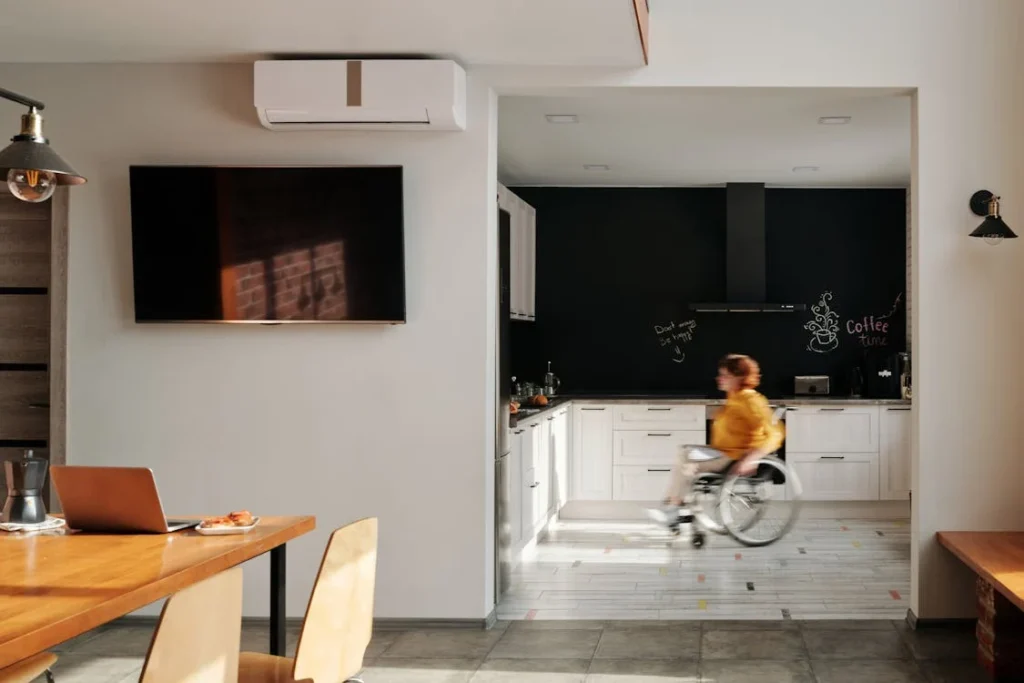
Advocating for Systemic Change in Accessible Housing
While enforcing your personal right to accessible housing is crucial, the larger goal should be to create a society where accessibility is a norm, not an exception.
India is gradually improving its approach to inclusive housing, but real change happens when individuals, communities, and policymakers work together.
Raising Awareness in Your Community
Many accessibility challenges stem from a lack of awareness. Housing societies, builders, and even government officials often fail to consider the needs of people with disabilities simply because they have never been educated on the issue.
You can play a role in changing this by engaging with your community.
If you live in an apartment complex, talk to the management committee about accessibility upgrades. Simple changes, like installing a ramp at the entrance or ensuring elevators are maintained, can make a big difference.
If you encounter resistance, highlight the legal requirements under the RPWD Act and explain how these changes benefit everyone, including elderly residents and parents with strollers.
If you are part of a Residents’ Welfare Association (RWA), propose discussions on accessibility in meetings. Many RWAs take on improvement projects, and making buildings more inclusive can become part of their agenda.
Partnering with disability rights organizations can also help bring expert knowledge to the discussion.
Engaging with Local Government Officials
Local governments play a key role in enforcing accessibility standards. Municipal corporations and urban development authorities are responsible for approving building plans and ensuring that public spaces meet accessibility guidelines.
If you notice that new construction projects are not following these requirements, you can bring it to the attention of your local authorities.
Write to your municipal commissioner or urban development officer, explaining the issue. If a public housing project lacks accessibility features, file a Right to Information (RTI) request to check whether accessibility was included in the approved plan.
If it was, the authorities can be pressured to take corrective action. If not, it signals a serious gap in enforcement that needs to be addressed.
Government schemes such as the Pradhan Mantri Awas Yojana (PMAY) include provisions for housing people with disabilities. If you are eligible for a government housing scheme, ensure that the allocated home meets accessibility standards.
If it does not, you can file a grievance with the Ministry of Housing and Urban Affairs.
Partnering with Disability Rights Organizations
Advocacy is stronger when done collectively. Many non-governmental organizations (NGOs) and disability rights groups work tirelessly to ensure that accessible housing becomes a reality.
Partnering with these organizations can provide legal support, media attention, and community backing for your cause.
Groups like the National Centre for Promotion of Employment for Disabled People (NCPEDP) and Disability Rights India Foundation (DRIF) have successfully pushed for legal reforms and infrastructure improvements.
If you face challenges enforcing your rights, reaching out to these organizations can provide guidance and amplify your voice.
Promoting Policy Changes
Long-term improvements in accessible housing require policy-level changes. If you are passionate about this issue, consider advocating for stronger legal protections and better implementation of existing laws.
Writing to policymakers, submitting petitions, and participating in public consultations can influence future regulations.
One of the biggest gaps in accessibility law is enforcement. While the RPWD Act mandates accessible housing, penalties for non-compliance are often weak. Stronger penalties and better monitoring mechanisms could ensure that accessibility is taken seriously.
By engaging with disability commissioners, urban planning departments, and lawmakers, you can contribute to policy discussions that shape the future of inclusive housing.
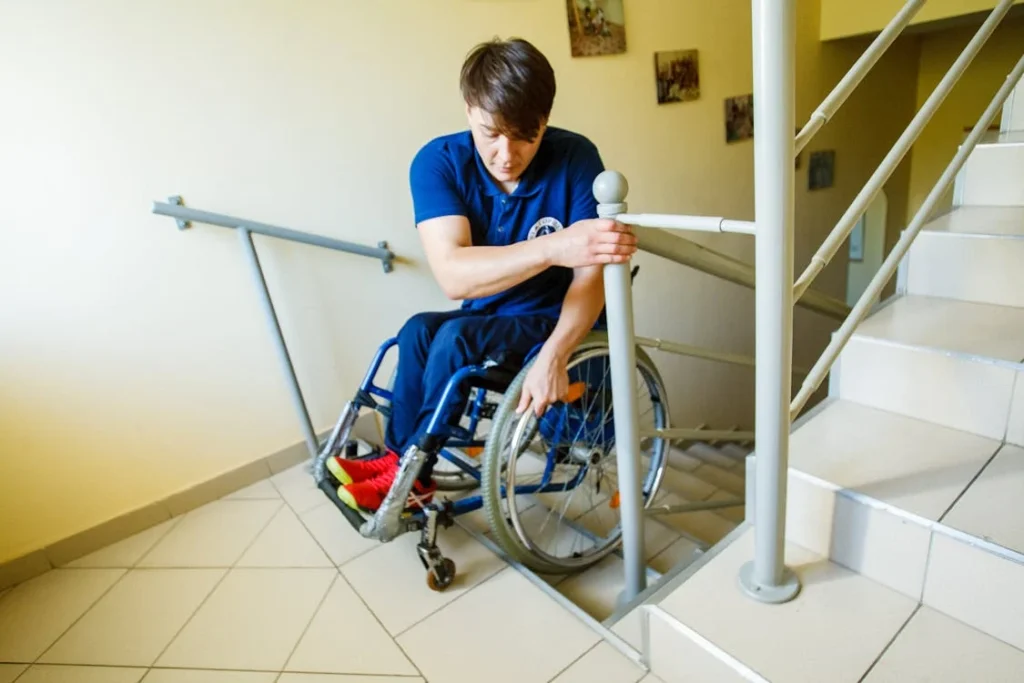
Overcoming Common Barriers to Accessible Housing
Even when legal protections exist, people with disabilities in India still face significant obstacles in securing accessible housing.
These challenges often stem from bureaucracy, financial constraints, social stigma, and a lack of enforcement of accessibility standards. Understanding these barriers—and knowing how to overcome them—can help you navigate the system more effectively.
Dealing with Bureaucracy and Delays
One of the biggest frustrations when enforcing your right to accessible housing is the slow-moving bureaucracy.
Whether you are filing a complaint with government agencies, requesting modifications in a housing society, or applying for benefits under a government housing scheme, the process can be lengthy and confusing.
To navigate bureaucracy efficiently, document everything. Keep copies of emails, letters, and official responses from builders, landlords, or government authorities.
If a housing society refuses to allow modifications, ask for their response in writing. Written records can serve as evidence if you need to escalate the issue.
If officials delay your complaint or fail to take action, consider filing an RTI request to check the status of your case.
The Right to Information Act allows you to demand updates on pending applications, forcing authorities to respond within a set timeframe. In many cases, RTI applications prompt quicker action.
Finding Financial Support for Accessibility Modifications
Modifying a home to make it accessible can be expensive, especially if landlords or housing societies refuse to share the cost. However, there are financial resources available that can help offset these expenses.
The National Handicapped Finance and Development Corporation (NHFDC) offers loans and grants for home modifications.
These funds can be used for installing ramps, widening doorways, modifying bathrooms, or making other necessary changes. Banks and financial institutions also offer home loans that include provisions for accessibility modifications.
If you are living in government housing or applying for a home under the Pradhan Mantri Awas Yojana (PMAY), check if there are provisions for accessible modifications. Some state governments offer subsidies for home improvements, including accessibility features.
If your employer provides housing benefits, check whether they include provisions for accessibility modifications. Some companies offer financial support for employees with disabilities who need to make adjustments to their living spaces.
Challenging Social Stigma and Resistance
Discrimination against people with disabilities is not always direct, but it is deeply ingrained in housing policies and societal attitudes.
Some landlords refuse to rent to people with disabilities because they believe modifications will reduce property value. Others assume that tenants with disabilities will be “difficult” or require constant assistance.
Overcoming these attitudes requires persistence. If a landlord refuses to rent or sell to you based on disability, remind them that this is a violation of the RPWD Act.
If they still refuse, you can file a complaint with the local housing authority or the State Commissioner for Persons with Disabilities.
Housing societies sometimes resist accessibility modifications, fearing that changes will disrupt aesthetics or property values. In such cases, educating the community can help.
Organizing awareness sessions or inviting disability rights organizations to speak at society meetings can shift perspectives. If that fails, legal intervention may be necessary.
Holding Builders and Developers Accountable
Builders and developers frequently violate accessibility laws, either by omitting promised features or failing to meet minimum accessibility standards.
If you purchase a flat based on promised accessibility features that are not delivered, you can take legal action under the Real Estate (Regulation and Development) Act (RERA). RERA allows buyers to file complaints against developers who fail to meet their commitments.
In many cases, builders respond to legal notices and consumer complaints quickly to avoid legal battles. If the issue persists, approaching consumer forums or civil courts can force them to act.
Media attention can also be a powerful tool—highlighting accessibility violations in newspapers or social media often compels developers to make corrections.
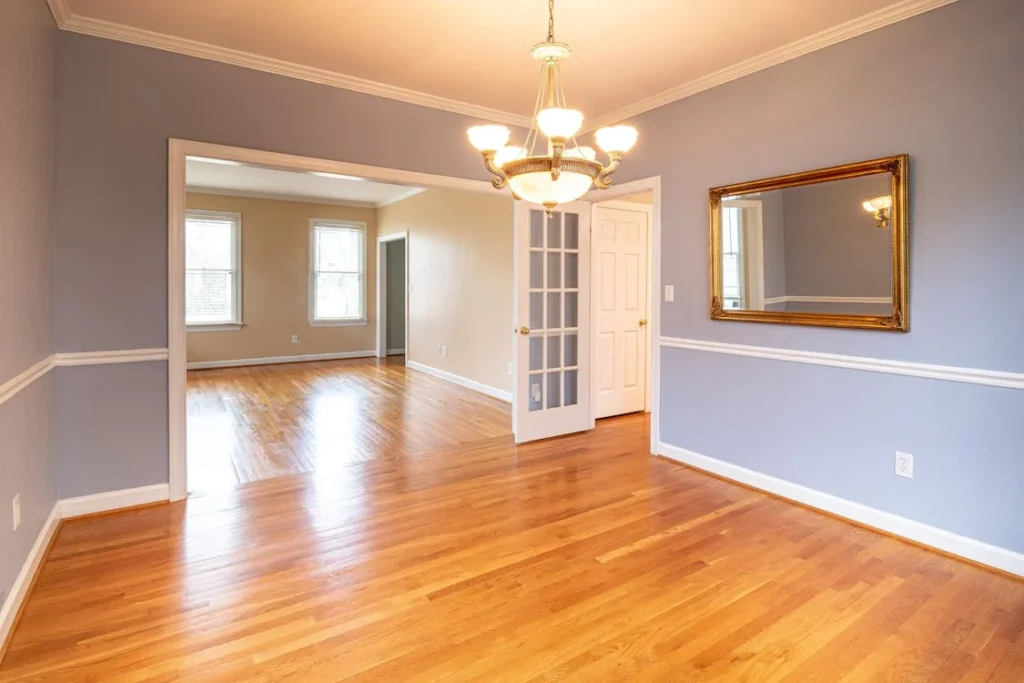
Creating a Long-Term Impact for Accessible Housing
While enforcing your personal right to accessible housing is important, the larger goal should be systemic change. The more people advocate for accessibility, the sooner it will become a standard practice rather than an exception.
Ensuring accessible housing in India requires continuous effort, from influencing policy changes to holding builders, landlords, and housing societies accountable.
Building a Stronger Legal Framework
One of the key reasons accessibility issues persist is that while laws exist, their enforcement is weak. Many builders do not face penalties for failing to include accessibility features, and landlords continue to deny housing to people with disabilities without consequences.
Strengthening the implementation of the Rights of Persons with Disabilities (RPWD) Act, 2016 and other housing-related regulations is crucial.
Advocating for better monitoring systems and stricter penalties for non-compliance can drive real change. Government agencies must be pressured to conduct regular audits on new and existing housing projects to ensure they meet accessibility standards.
The public can play a role by filing complaints when accessibility laws are ignored. The more cases that reach the authorities, the more likely they are to take action.
Making Accessibility a Standard in Urban Planning
Urban planning in India still does not prioritize accessibility, despite existing guidelines. City planners, architects, and policymakers need to incorporate universal design principles from the beginning, rather than treating accessibility as an afterthought.
Public awareness campaigns can help promote the idea that accessible design benefits everyone, not just people with disabilities.
Advocacy groups and individuals can push for local and state governments to include accessibility in smart city projects, housing schemes, and infrastructure planning.
Engaging with town planning officials and participating in public discussions on housing policies can help bring accessibility into mainstream development plans.
Encouraging Real Estate Developers to Prioritize Accessibility
Most real estate developers focus on high-end amenities, often ignoring the importance of accessibility. However, accessibility should not be a “special feature”—it should be a fundamental part of every housing project.
Developers need to see accessibility as a market demand, not just a legal requirement.
Consumers can influence this by demanding accessibility features when buying or renting properties. If more buyers and tenants prioritize accessible homes, developers will be forced to incorporate these features to remain competitive.
Writing online reviews and sharing experiences on social media can also put pressure on builders to prioritize inclusive design.
Educating the Public and Future Generations
Long-term change begins with awareness. Schools, colleges, and professional training programs for architects, urban planners, and civil engineers should include accessibility as a core part of their curriculum.
If future builders and designers understand the importance of inclusive housing, accessibility will become a natural part of their work.
Community awareness programs can also play a role. Disability rights organizations, NGOs, and social media campaigns can help shift societal attitudes towards accessibility.
When more people understand that accessible housing benefits everyone, not just people with disabilities, there will be stronger public support for these initiatives.
Holding Government and Institutions Accountable
Government bodies at all levels—municipal, state, and national—must be held accountable for enforcing accessibility laws.
Citizens can play a role by regularly reporting violations, participating in public discussions on housing policies, and engaging with disability rights organizations that push for better enforcement.
Regular audits and compliance checks should become standard practice. If public housing projects fail to meet accessibility standards, responsible officials must be questioned.
Citizens can file public interest litigations (PILs) to demand stricter implementation of laws related to accessible housing.
A Future of Inclusive Living
Enforcing the right to accessible housing in India is not just about ensuring individuals have a safe and comfortable place to live—it is about changing the way society views disability and inclusion.
Progress is happening, but much more needs to be done. By knowing your rights, taking action, and working collectively to push for change, you can help create a future where accessible housing is not a privilege, but a standard for all.
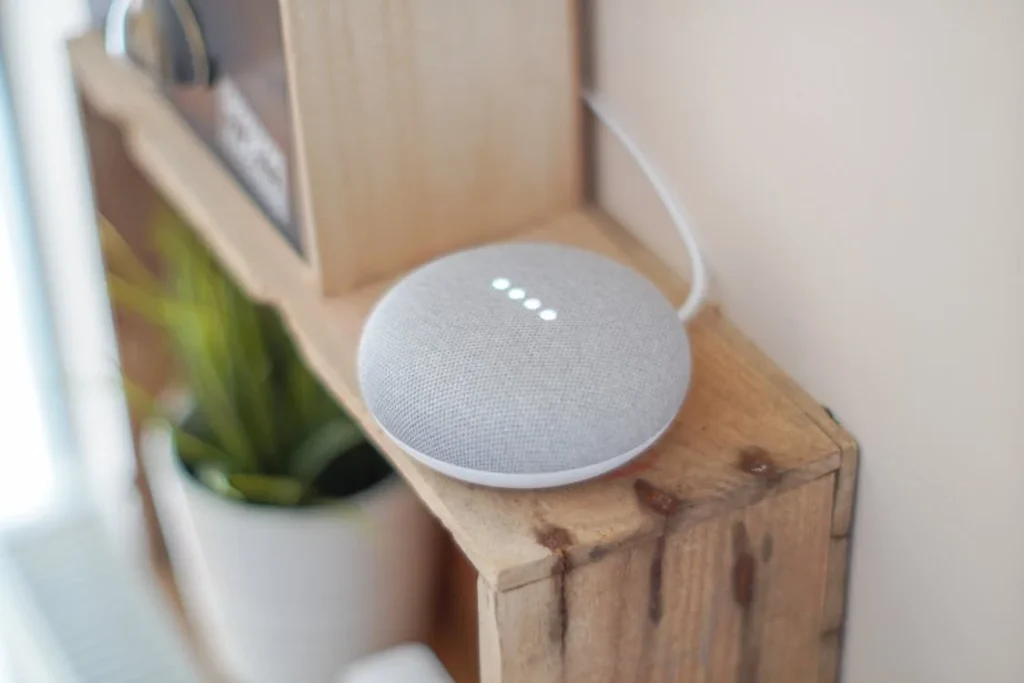
The Role of Technology in Advancing Accessible Housing
While legal advocacy and policy changes are crucial for enforcing the right to accessible housing, technology is emerging as a powerful tool to bridge the accessibility gap.
Smart home innovations, assistive technologies, and digital platforms are transforming how people with disabilities interact with their living spaces. These advancements are not just making homes more accessible but also providing greater independence and security.
Smart Home Technology for Greater Independence
Smart home technology allows people with disabilities to control their environment with ease.
Voice-activated assistants such as Amazon Alexa and Google Assistant enable users to turn on lights, adjust room temperatures, lock doors, and control entertainment systems without needing to physically interact with switches or remotes. This is especially beneficial for individuals with limited mobility.
Automated door systems, motion-sensor lighting, and smart security systems further enhance accessibility. These technologies eliminate barriers for individuals who may struggle with traditional locks, switches, and alarm systems.
The growing affordability of these solutions makes them an essential part of modern accessible housing.
3D Printing and Custom Accessibility Solutions
One of the biggest challenges in modifying homes for accessibility is the high cost of customization. 3D printing is changing this by making it possible to create affordable, tailor-made solutions.
From wheelchair ramps that perfectly fit uneven surfaces to adaptive door handles and customized kitchen tools, 3D printing offers practical accessibility solutions that were previously expensive or unavailable.
At Robobionics, we leverage 3D printing for prosthetics, and the same technology is being used globally to develop innovative home modifications.
Customizable grab bars, ergonomic furniture, and even modular walls that adapt to individual needs are now being designed using 3D printing, making accessibility more affordable and scalable.
Virtual Reality (VR) for Housing Design and Accessibility Testing
One of the most frustrating issues people with disabilities face when moving into a new home is discovering that it is not as accessible as promised.
Virtual reality (VR) is helping solve this problem by allowing individuals to explore homes before moving in. Developers can create virtual walkthroughs that let potential buyers or tenants test a home’s accessibility before making a decision.
Architects and builders can also use VR simulations to test accessibility designs before construction begins. This ensures that ramps, doorways, and other modifications truly meet the needs of users.
When accessibility is tested at the planning stage, costly post-construction modifications can be avoided.
AI-Powered Accessibility Assessments
Artificial intelligence (AI) is playing a growing role in assessing the accessibility of homes and public buildings. AI-powered apps can scan floor plans and detect potential barriers, such as narrow hallways, poorly placed switches, or inaccessible restrooms.
These tools help architects and property developers design spaces that comply with accessibility standards before construction begins.
Mobile applications are also using AI to assist people with disabilities in navigating their surroundings. Apps that recognize obstacles, read printed text aloud, or provide voice-guided navigation are making homes and communities more inclusive.
The Future of Technology-Driven Accessibility
The integration of technology in housing is redefining what accessibility means. Smart home automation, AI assessments, and virtual reality are not just conveniences—they are becoming essential tools in ensuring that people with disabilities can live independently and with dignity.
As technology continues to evolve, it is crucial for policymakers, architects, and housing developers to embrace these advancements as standard practices.

Conclusion
Accessible housing is not just a legal right—it is a necessity for millions of people in India. While challenges remain, the combination of strong legal protections, persistent advocacy, and emerging technology is making inclusive housing more achievable. Enforcing accessibility laws, challenging discrimination, and pushing for policy improvements are essential steps in ensuring that everyone, regardless of ability, can live with dignity and independence.
Technology is also playing a growing role in making homes more accessible. Smart home automation, AI-powered assessments, and 3D-printed modifications are providing cost-effective and scalable solutions. As these innovations become more widespread, accessibility will no longer be an afterthought but a standard in housing development.
The path to fully accessible housing in India requires collective action. Whether you are fighting for your personal rights, raising awareness in your community, or influencing broader policy changes, every step contributes to a more inclusive future. By staying informed and proactive, we can ensure that accessible housing becomes a reality for all.
If you are looking for assistive technology solutions or need guidance on accessible living, Robobionics is here to help. Contact us today to explore innovative solutions designed to empower independence!



